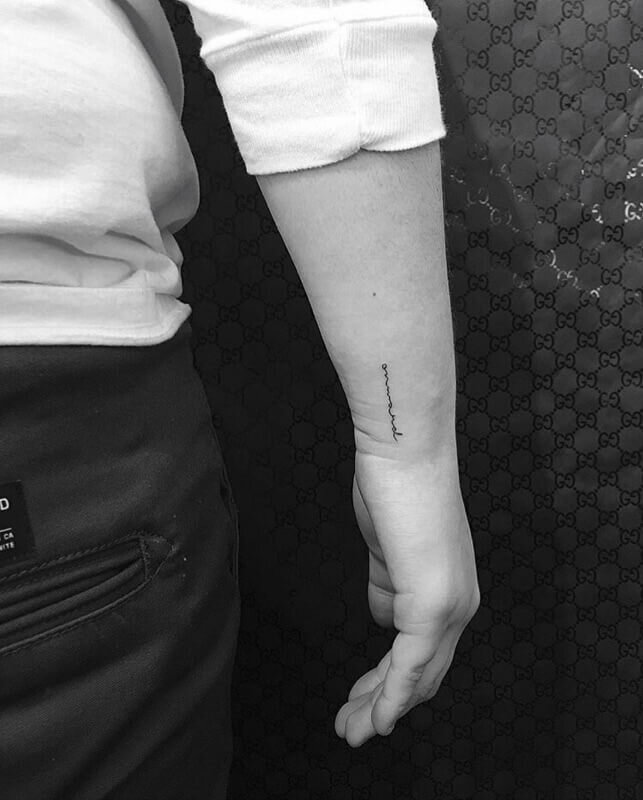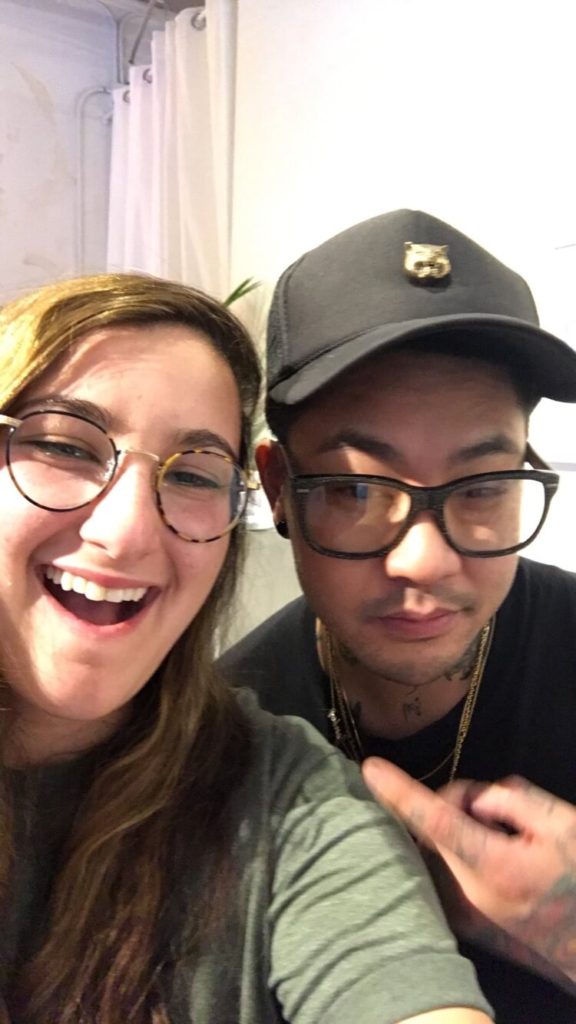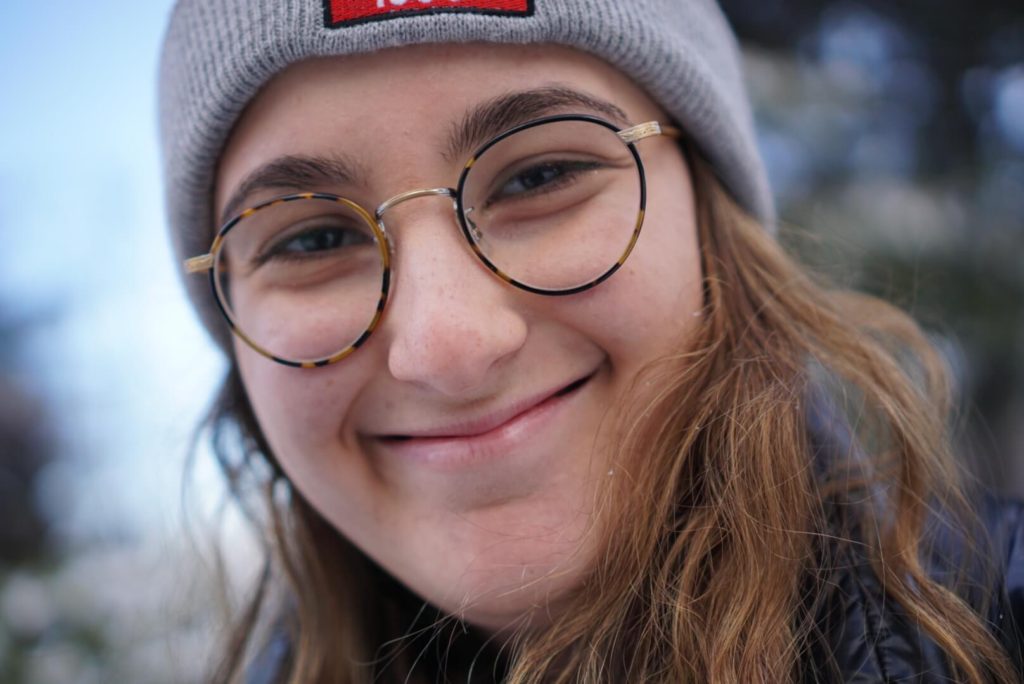
I had never wanted a tattoo. But during my first summer home from college, I decided I wanted a chai tattoo (a Jewish symbol for “life”) and I wanted it in an obscure place so I could hide it from my parents.

Not even a year later, I got my second tattoo, and I’m more in love with it than my first. There’s this artist who specializes in script, Jonboy – who’s very hard to get an appointment with. Every now and then, he’ll do a popup tattoo event somewhere in NYC for a few hours. In February, I saw that he was doing one and texted my friend, “We’re going.” I knew I wanted a meaningful tattoo in Jonboy’s handwriting, but I couldn’t decide on the message. And then it hit me: “onward.” Like many others, I’ve faced adversity with mental health, and, for me, “onward” serves as a reminder to keep going. The word is on the side of my wrist in small script and is extremely visible, but I love it and don’t care. Oftentimes because of how small the script is, others can’t read it and think it’s an artistic design. I love that if someone really wants to know what it is they have to ask me about it.
My parents also aren’t huge fans of tattoos because of our Jewish background. Jews and tattoos typically do not go together. My parents always said that if you had a tattoo you couldn’t be buried in a Jewish cemetery. Before I got my first tattoo, I extensively researched the issue and learned that the cemetery thing is a myth that stems from our bodies being a loan from God. The Torah does not say anything specific about not being able to be buried in a Jewish cemetery if you have a tattoo. (For more information about the Jewish attitude toward tattoos and where it comes from, read this piece on MyJewishLearning.com.)
I told my mom about my first tattoo about a month after I got it, in September 2016. To say she approved would be an exaggeration, but she did kind of like it. That’s an approval in my book. I didn’t tell my dad about either tattoo until February 2017, after I got my second tattoo, which I posted on social media. I figured he’d find out anyway. He was shocked and slightly disappointed, but he has warmed up to my tattoos as well.
Both my parents did ask me if having a visible tattoo would affect my chances of getting a job. First of all, I joked, I’m an artist studying Dramatic Writing at Tisch…I’ll probably never have a job! But seriously, times are changing: 40% of Millennials have at least one tattoo. More of my friends have tattoos than don’t, even the ones who want to go into law and medicine. Tattoos have changed from drunken, tasteless mistakes in dirty tattoo parlours filled with grungy men to carefully thought-out body art inked in clean, high-quality shops that pay attention to hygiene and safety, and employ numerous female artists as well. The people I know who have tattoos spent a decent amount of time researching artists and designs, the same way art collectors might do before buying a painting to display in their homes. One of my friends even knows what tattoos he wants and where, but has been searching for an artist for years. Before he commits to permanent body art, he wants to ensure he finds an artist who can ink exactly what he pictures in his mind
I spoke with some of my friends about their tattoos and what they meant: none of the tattoos were drunk, spontaneous decisions. They were deliberate inkings of their passions and proclamations of their identity on their bodies, for all to see.
“Most of my tattoos have pretty simple meanings,” said Molly, a Vassar student and the bearer of a paper crane, pawprints and sun tattoos, explaining that the pawprint was for her dog Chloe, and the sun symbolizes her home state of Florida. ”The paper crane I got because it’s very therapeutic to me. I make paper cranes as a coping mechanism for anxiety/panic attacks, and it has helped me see a part of me and my life that is usually associated with pain in a way that is instead more like this is part of me. And I need to see it as such rather than try to ignore it. For that reason, it was my first tattoo. But for the next ones, I want tattoos that are simply beautiful and want that beauty on my body. Tattoos make me feel beautiful and that’s what is important to me.”
“I hope to go into law, but I did not let that stop me from getting a tattoo,” said Parker, a student at NYU. “To me, my tattoo — which is on my wrist — is a daily reminder to push harder and keep trying in hopes that one day I can make this world a little more just. I am not worried about it hurting me in the future. If law firms turn away all their applicants with tattoos by the time I am applying, they will not be able to hire anyone.”
Grace, a student at University of New South Wales, says her tree-with-a-sun tattoo “is a reminder of how I met my best friends at camp in the US. I’ve lived in Asia for most of my life and now I’m studying at university in Australia. It gets really tough sometimes being so far away and rarely getting to see them.” Her other tattoo is a Japanese word that means “strength” or “power.”
“If a stranger looked at this one tattoo they would think that it‘s cultural appropriation. However, I spent the first ten years of my life in Tokyo with Japanese being my first language. The first word that I ever learned how to write in my life was the word strength…I got the tattoo because growing up in Japan was the happiest stage of my life.”
Grace didn’t share my fear of sharing her tattoos with her parents. “Since I was 16, my parents said that as soon as I turned 18 my body was mine to do what I want with. It bothers me that people are still less likely to be hired because of visible tattoos. As a person who has both tattoos and a nose piercing, I believe that my physical features do not take away from my intellect or skills when working.”
I’m not worried about how having visible tattoos will affect my ability to get a job, or if others will judge me for my tattoos. The only relevant opinion of my tattoos is mine.
The stigma associated with tattoos isn’t going to change overnight, but I have great faith in my generation. We are the activist generation; we are the startup generation. We have pretty much proved that we can do anything and change almost anything (we haven’t been able to change the Trump presidency, but many of us are definitely actively fighting it). And we will change the workplace. The workplace will evolve into a more casual, creative-centric atmosphere. In ways, it already has. Some major companies have adapted the casual, jean-and-tee-shirt lifestyle and tattoos live in the open. I’m interning at one of those companies this summer and my tattoo will be flying free.
I’m already looking forward to my third tattoo, even though I don’t know what exactly it will be. Right now, I’m leaning toward something that represents NYC, since moving here has truly changed my life. But whatever design I choose, I know it will be something meaningful.
 Erica Snyder is a Dramatic Writing student at NYU Tisch School of the Arts. She is working on a novel and too many screenplays to count! When not in class, you can catch her taking photos around New York City. You can follow her on Instagram: @ericas112 or @esnyderphoto.
Erica Snyder is a Dramatic Writing student at NYU Tisch School of the Arts. She is working on a novel and too many screenplays to count! When not in class, you can catch her taking photos around New York City. You can follow her on Instagram: @ericas112 or @esnyderphoto.


Grok Nation Comment Policy
We welcome thoughtful, grokky comments—keep your negativity and spam to yourself. Please read our Comment Policy before commenting.